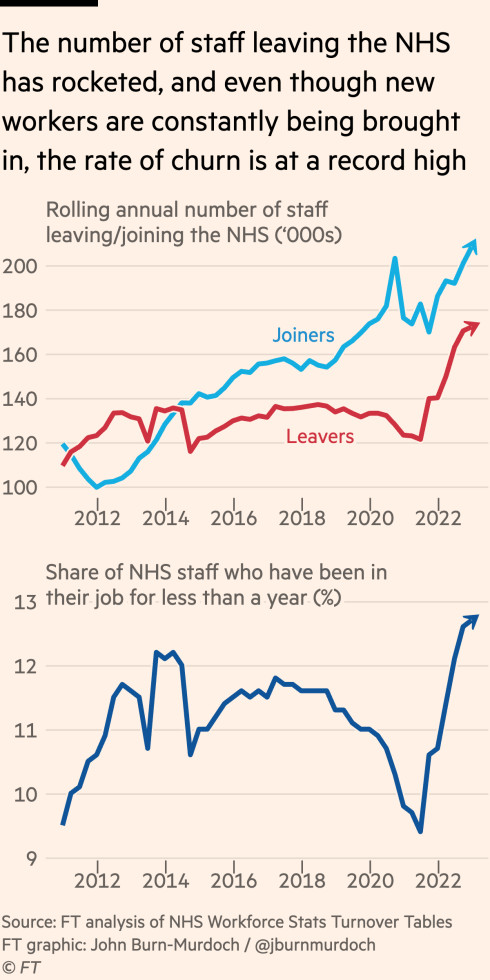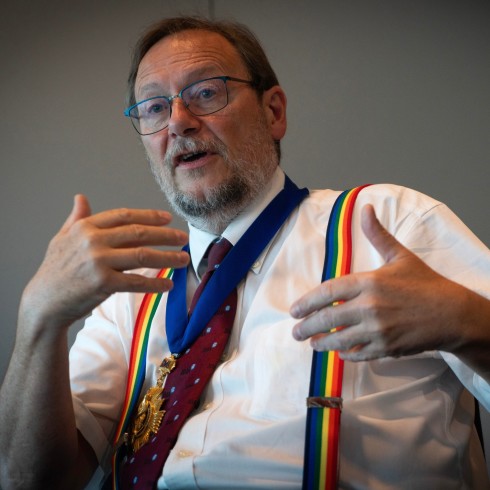NHS doctors’ 35% pay demand ‘not set in stone’, BMA union chief says
A demand by junior doctors for a pay rise of about 35 per cent is “not set in stone”, according to the head of the British Medical Association, signalling a possible compromise with the government in the union’s long-running wage dispute.
Philip Banfield, chair of the BMA’s ruling council, said the percentage was an indicative figure and suggested that an acceptance by ministers that NHS salaries had been eroded over many years could pave the way for talks.
In an interview on the eve of the 75th anniversary of the founding of the NHS on Wednesday, Banfield suggested the backdrop to the strikes in England was an underfunded and understaffed health system in which demand outstripped resources by fourfold and rationing of care was increasingly evident.
Steve Barclay, health and social care secretary, has blamed the junior doctors — those below consultant grade — for refusing to budge from their pay demand, which they claim is needed to reverse 15 years of wage erosion, saying negotiations cannot begin until they reduce it.
However, Banfield said: “The fundamental issue here is that the government refuses to acknowledge that there has been a fall in the value of pay.”
If that admission was made, “then the juniors would be able to say, ‘right OK, so now . . . let’s discuss how to get back to restoring that value over whatever period of time you want to negotiate about”, he added.

The percentage was “not set in stone at all. It’s an indicative amount that when we do our calculations back to 2008 and apply RPI to it, that’s the figure you get to,” he said.
Record numbers are waiting to start non-urgent treatment for conditions such as knee and hip replacements, a situation worsened by walkouts from staff across the NHS, including nurses and ambulance workers, which has contributed to more than 650,000 cancellations of operations or appointments.
Banfield said the unprecedented scale of the action “reflects the frustration and anger of the frontline staff of not being valued in getting on with the job”.
But he played down the impact on waiting lists, pointing to a hollowing out of NHS workforce and infrastructure over many years. “I would argue that operations are cancelled every day because of lack of capacity, not enough staff, not enough beds.
“The industrial action that takes place for a few days doesn’t materially add to the overall picture,” he claimed.
He also defended the decision by consultants to strike for two days in pursuit of their own pay demand, insisting patients would not come to harm as a result. Emergency cover would be unaffected as senior doctors would provide a “Christmas Day” service. “We will keep patients safe . . . no ifs or buts,” he said.
Banfield suggested that “recalibrating the value of doctors and what they do in the workplace” was in some ways even more important than a pay rise for his members.
Referring to physician associates, he said: “You’ve now got people in the workplace who can do less than doctors, being paid £10,000 more and that’s the quickest way of driving doctors out of the NHS and out of the UK.”
Junior doctors have been painted as militants and criticised for their hardline stance in a battle fought partly through social media. Defending the approach, Banfield said: “This government has ignored anyone who has tried to talk to them nicely. It just gets blanked.”
Banfield, who began medical school in 1979, said he was “not going to criticise the juniors for organising themselves, motivating themselves, getting their spirits together . . . I admire their get up and go. I wish my generation had [had] such determination.”
He added: “It is the bloody mindedness of this government that is really getting in the way of resolving these disputes.”
Banfield, comprehensive-school educated and trained at St George’s hospital in south-west London, was the first in his family to attend university.
He recalled being told that he should not aspire to gain a place at a distinguished London teaching hospital because no one from his school had ever done so. “That exposed my characteristic of ‘when someone tells me it can’t be done, do it’,” he added.

Working as a consultant in obstetrics and gynaecology in Rhyl, a deprived area of North Wales, he said the social mix he encountered at school “kept my feet on the floor . . . and I feel at home with these patients because you’re standing up for them and with them as part of the advocacy against the system.”
Separately, the heads of three leading health and care research institutes, the King’s Fund, Nuffield Trust and Health Foundation, have written to the leaders of the three largest political parties in England, calling on them to commit to long-term investment and reform of the NHS.
“Persisting with the current addiction to short-termism and eye-catching initiatives will risk the health service being unable to adapt to the huge challenges ahead and reach its centenary,” they wrote.
Banfield said that, while there was “absolutely no fundamental reason” why the current, taxpayer-funded model of the NHS could not survive, amid an enormous strain on its resources Banfield suggested the public needed to be involved in a discussion about what it could deliver in future.
He pointed to an initiative by BMA Scotland, which was calling for “a big conversation with the Scottish government to say ‘actually if there is a mismatch between resource and provision, then you’ve got to talk to the public about what is going to be provided and not provided’.”
The health department said the government had presented an opening offer — a 5 per cent increase and one-off payment for 2023-24 — “and there were active discussions ongoing about a range of pay and non-pay measures to improve the working lives of junior doctors.
“However, the junior doctors committee turned their back on negotiations by announcing further strikes,” it added.
The government had been “clear that strikes must be paused while talks take place, and we remain ready to continue talking at any point if strikes are called off and the junior doctors committee show willingness to move significantly from their unreasonable pay demands”, it added.
This story originally appeared on: Financial Times - Author:Sarah Neville




























